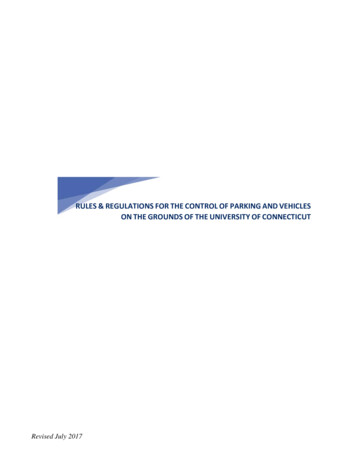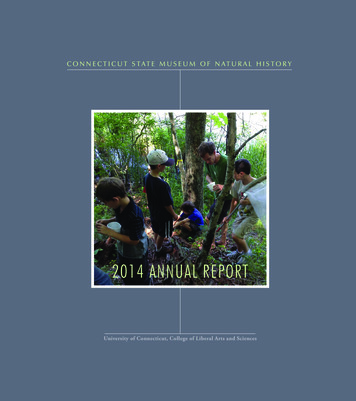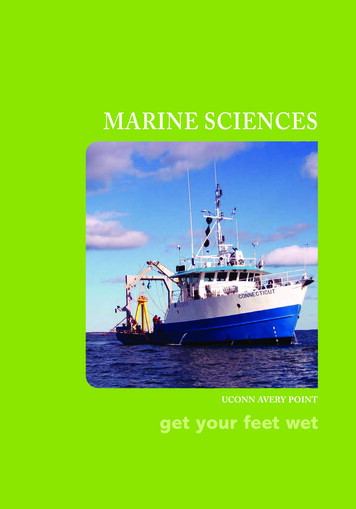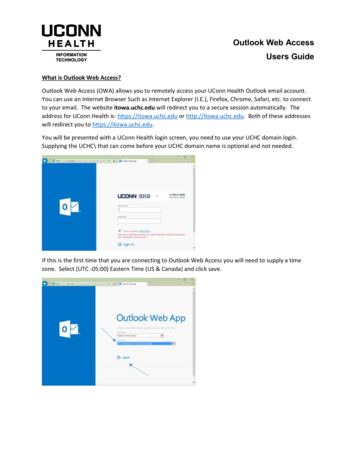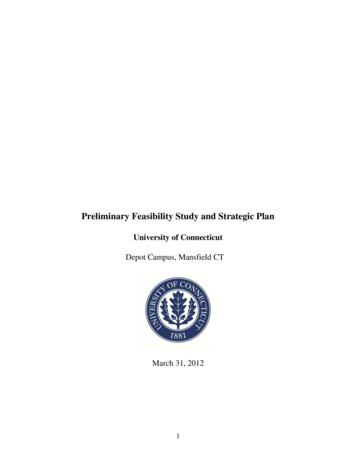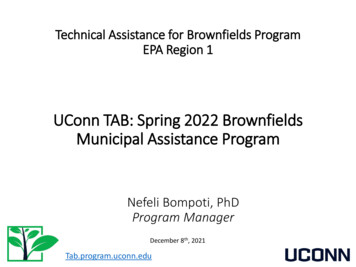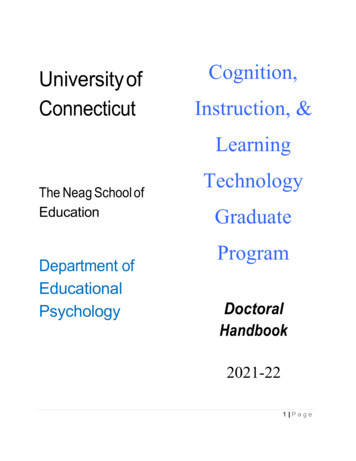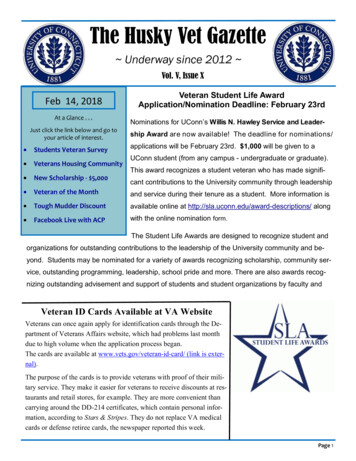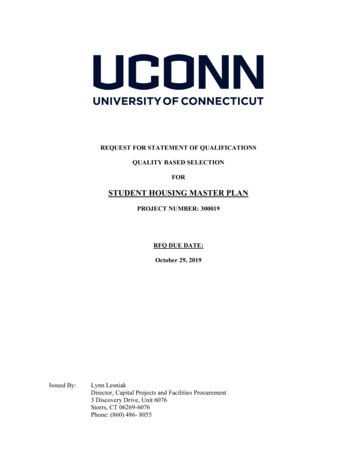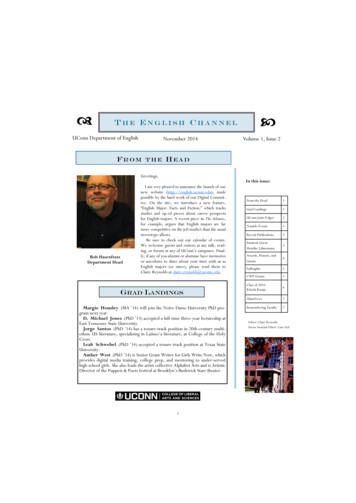
Transcription
THE ENGLISH CHANNELUConn Department of EnglishNovember 2014 Volume 1, Issue 2FROM THE HEADGreetings,.Bob HasenfratzDepartment HeadIn this issue:I am very pleased to announce the launch of ournew website (http://english.uconn.edu), madepossible by the hard work of our Digital Committee. On the site, we introduce a new feature,“English Major: Facts and Fiction,” which tracksstudies and op-ed pieces about career prospectsfor English majors. A recent piece in The Atlantic,for example, argues that English majors are farmore competitive on the job market than the usualstereotype allows.Be sure to check out our calendar of events.We welcome guests and visitors at any talk, reading, or forum at any of UConn’s campuses. Finally, if any of you alumni or alumnae have memoriesor anecdotes to share about your time with us asEnglish majors (or since), please send them toClaire Reynolds at claire.reynolds@uconn.edu.GRAD LANDINGSMargie Housley (MA ’14) will join the Notre Dame University PhD program next year.D. Michael Jones (PhD ’13) accepted a full-time three-year lectureship atEast Tennessee State University.Jorge Santos (PhD ’14) has a tenure-track position in 20th-century multiethnic US literature, specializing in Latino/a literature, at College of the HolyCross.Leah Schwebel (PhD ’14) accepted a tenure-track position at Texas StateUniversity.Amber West (PhD ’14) is Senior Grant Writer for Girls Write Now, whichprovides digital media training, college prep, and mentoring to under-servedhigh-school girls. She also leads the artist collective Alphabet Arts and is ArtisticDirector of the Puppets & Poets festival at Brooklyn’s Bushwick Starr theater.1From the Head1Grad Landings1UConn Joins Folger2Notable Events2Recent Publications3Eminent Guest:Henrike Lähnemann3Awards, Honors, andGrants4Fulbrights5CWP Grants5Class of 2014:Krisela Karaja6AlumNews7Remembering Faculty7Editor: Claire ReynoldsIntern Assistant Editor: Cam Atzl
UCONN JOINS FOLGERNOTABLE EVENTSUConn has been invited to join the Folger Institute’s consortium of more than 40 college and university members. The FolgerInstitute is a center for advanced study and collections-focusedresearch in the humanities at the Folger Shakespeare Library inWashington, DC. The consortium comprises some of the mostprestigious academic institutions in North America and the UK—only a third of which are public. These include the University ofNorth Carolina at Chapel Hill, Ohio State University, Pennsylvania State University, and the University of Virginia.“Being asked to join the consortium is a recognition of thestrength of scholarship in the Medieval, Renaissance, and earlymodern periods at UConn,” says Shirley Roe, Associate Dean forHumanities in the College of Liberal Arts and Sciences.The Institute’s scholarly programs provide researchers withguided access to the Folger Shakespeare Library, which is home toone of the world’s largest collections of Shakespeare materials andother major collections of rare books, manuscripts, and works ofart. Consortium members receive priority admission to the FolgerInstitute’s highly competitive annual series of advanced seminars,workshops, and colloquia for faculty and graduate students. Theyare also eligible for tuition waivers and grants-in-aid to cover program expenses.“The consortium includes the best Renaissance studies programsin the country, and their best students are being encouraged toapply,” says Gregory Semenza, associate professor of English atUConn who participated in a Folger Institute seminar as a firstyear PhD student. “People who participate in these programs saythat it changes their lives dramatically, essentially impacting theircareers and their connections with other people in the field.”Semenza notes that the library houses some of the most important historical documents in the world, including 82 copies ofShakespeare’s First Folio—the first collected edition of 36 playsby Shakespeare, published after his death in 1623. “It gives us firsthand access to materials that cannot be reproduced in digital formats,” he says.To promote the consortium’s benefits on campus, UConn hasformed a committee that will vet applications to Folger Instituteprograms in Washington and plan Institute-affiliated guest lectures, seminars, and other events on the Storrs campus. The committee, consisting of representatives from several departments inthe College of Liberal Arts and Sciences and the School of FineArts, is housed in the Humanities Institute.Semenza adds that membership in the Folger strengthens theentire spectrum of humanities offerings at UConn.“Much of the focus now is on subjects like digital humanities andhuman rights, which have more obvious connections to moremodern periods of history,” he says. “It is easy to overlook earlierperiods as a result, but if you invest in your foundational historiesand literatures, there are huge payoffs.”The 51st Annual Wallace Stevens Poetry Program in Aprilfeatured Pulitzer Prize-winning poet Paul Muldoon. Hailed byThe Times Literary Supplement as “the most significant Englishlanguage poet born since the second World War,” Muldoon haspublished more than 30 collections of poems. He currently servesas chair of the Lewis Center for the Arts at Princeton, where he isalso the Howard G. B. Clark Professor in the Humanities.Belfast novelist Glenn Patterson joined us for our 2014 Elizabeth Shanley Gerson Irish Literature Reading on April 8.Author of eight novels since 1988, Patterson also produces documentaries for the BBC and wrote the screenplay for Good Vibrations,a recent movie about the 1970s punk scene in Belfast. His habitualtheme is reevaluation of the recent Northern Irish past, particularly“The Troubles.” His most recent novels are The Mill for Grinding Old People Young (2012) and The Rest Just Follows (2014).Professor Kathleen Hill of Sarah Lawrence College read onSeptember 25 from her current project on the Brontës and discussed her novel Who Occupies This House (2010). Her book,the tale of a multiple-generation Irish-American family and thehouse they have lived in for more than a century, received notablecritical acclaim in both the US and France; her short stories haveappeared in multiple books.Janice Law (Trecker) read from Moon Over Tangier, thethird in her Francis Bacon series published by Mysterious Press.Her character Francis Bacon, is based on the great 20th-centuryBritish painter. In addition to being a prolific and talented author,Law is also an accomplished painter herself.Local poet Lisa Taylor, who has published four collections, helda poetry reading on October 14. Her work has been nominated forthe Pushcart Prize and she has been published in numerous national journals and anthologies. Taylor has conducted workshops inIreland and the US. She has received a Surdna Arts Teaching Fellowship, enabling her to spend a summer in Ireland collaboratingwith Galway writer Geraldine Mills on The Other Side of Longing. Mills and Taylor delivered the joint 2011 Elizabeth ShanleyGerson Irish Reading at UConn.On September 3, The Medieval Studies Program sponsored Medieval Live, a reading of magical duels, chilling steel fish, singingnuns, and desert haikus rendered from manuscripts for the digitalprojector and performed by faculty and students in the originallanguages of the medieval period. Translations were provided.Jared Demick read from his debut book of poems, The Hunger in Our Eyes, on October 15. He has published poems inBlazeVOX, Sugar Mule, Long River Review, OMEGA, and Gastronomica.He also edits The Jivin’ Ladybug: A Skewered Journal of theArts.FIRST-YEAR WRITING—Brianna Diaz, UConn Today, 18 August 2014INTERNSHIPS FEATUREDThe English Department’s internship program has been recently featured in The Chronicle of Higher Education. Writer DanBerrett lauds Ruth Fairbanks’s efforts in ensuring that studentinternships count as academic as well as career experiences byhaving students write one- or two-page reflections for each dayof work.On July 1 the program title “Freshman English” changed to “First-Year Writing” (FYW). All courses, credits, waivers, and requirements associated with the First-Year Writing Program will be asthey were for Freshman English. The name change is a result ofconversations with students, faculty, and staff who found the previous name too limited to describe our students and the work they doin our courses.2
RECENT PUBLICATIONSBedore, Pamela. Dime Novels and the Roots of American DetectiveFiction.Bloom, Lynn, and Louise Z. Smith, eds. Arlington Reader: Themes forWriters. 4th ed.Breen, Margaret S., ed. and introd. Critical Insights: Gender, Sex, andSexuality. 11 UConn faculty members, including Breen,contributed chapters to this volume.Brown, Pamela Allen, and Jean E. Howard, eds. As You Like It:Texts and Contexts.Capshaw, Katharine. “The Crisis Children’s Page, The Brownies’Book, and the Fantastic.” Protest and Propaganda: W.E.B. Du Bois,The Crisis, and American History.Coundouriotis, Eleni. The People’s Right to the Novel: War Fiction inthe Postcolony.Demick, Jared. The Hunger in Our Eyes.Fairbanks, A. Harris. “National Identity, Narrative Universals, andGuilt: Margaret Atwood’s Surfacing.” In Cognition, Literature, andHistory.Gorkemli, Serkan. Grassroots Literacies: Lesbian and Gay Activism andthe Internet in Turkey.Higonnet, Margaret R. “At the Front.” The Cambridge History of theFirst World War, Vol. 3: Civil Society.Hogan, Patrick Colm. “Emplotting a Storyworld in Drama:Selection, Time, and Construal in the Discourse of Hamlet.”Storyworlds Across Media: Toward a Media-Conscious Narratology.—. “Intertextuality and Allusion.” The Cambridge Handbook ofStylistics.—. “Postcolonial Humor, Attachment, and Yasujiro Ozu’s EarlySummer.” Cognitive Media Theory.—. “Stylistics, Emotion and Neuroscience.” The Routledge Handbookof Stylistics.—. With Frederick Luis Aldama. Conversations on Cognitive CulturalStudies: Literature, Language, and Aesthetics.Jacobus, Lee A. Hawaiian Tales: The Girl with Heavenly Eyes.Knapp, Kathy. American Unexceptionalism: The Everyman and theSuburban Novel after 9/11.Litman, Ellen. Mannequin Girl.Marsden, Jean. “The Problem With Inkle: A Study inPerformance.” The Oxford Handbook of Georgian Theatre, 17371832.Murphy, Brenda. The Theatre of Tennessee Williams.Pelizzon, Penelope. Whose Flesh is Flame, Whose Bone is Time.Recchio, Thomas. “Passion and Economics in Jane Eyre and Northand South.” Critical Insights: Jane Eyre.Roden, Frederick S. “Wild(e) Theology.” More Than a Monologue:Sexual Diversity and the Catholic Church. Vol. 2: Inquiry, Thought,and Expression.Somerset, Fiona. Feeling Like Saints: Lollard Writings after Wyclif.West, Amber. “Making a Troublemaker: Charlotte Charke’s Proto-Feminist Punch.” Routledge Companion to Puppetry and MaterialPerformance.Vials, Chris. “Broken Frames: The World War II Novel and theLegibility of Class in the U.S. Historical Imagination.” Class andthe Making of American Literature: Created Unequal.EMINENT GUESTImagine a world without Microsoft Word. A world where theonly way to save a document is to preserve the physical copy. Wouldyou be more cautious of what you dispose of? Or would you, like thenuns of the Middle Ages, find creative ways to recycle your sacredmanuscripts?Weaving parchment manuscripts into the fabric of dresses as a wayto recycle sacred documents was a popular craft among the nuns ofthe 15th century. These manuscripts were copied in German andLatin by nuns in various convents.“Parchment is a very thin but very strong material, nearlyinflammable,” Chair of German studies in the School of ModernLanguages at Newcastle University, says Professor HenrikeLähnemann. “It was the plastic of the Middle Ages. It could beformed and shaped into all different things.”Lähnemann, who has published five books and six essaycollections, has one main focus in her study of manuscript fragmentsin medieval dresses: “What does it tell us about the devotionalculture of the 15th century?”To answer her question, she focused on one of the convents,Wienehausen, that was auspiciously preserved “in a sort of timewarp.” Wienehausen was a 14th-century convent that was home tovarious 13th-century statues and sculptures of the Virgin Mary andthe Christ Child. Here, the sacred manuscripts written by the nuns“were woven into textiles for devotional purposes, such as to dressup religious statues or to be used in a production of the PassionPlay,” Lähnemann said. “Wienehausen was the center for theproduction of manuscript dresses, where the nuns used theparchment-lined garments to dress the sculptures of Mother andChild.”The garments were made of a fine woven silk called lampas,trimmed with rabbit fur, and decorated with various ornaments andapplications. For this reason, the inscribed parchment, muchsturdier than fabric, was used to line the dresses.Today, Hartford’s St. Patrick-St. Anthony Church, the oldestchurch in Connecticut, has statues of Madonna and Child behindthe altar that are dressed for different occasions by groups of localchurch-goers, Lähnemann said.3
AWARDS AND HONORSMary K. Bercaw Edwards was named Extracts editorfor Leviathan: A Journal of Melville Studies.Sarah Berry’s “Rethinking Intertitles: The Voice andTemporality of Lyric Intertitles in The Cry of the Children”won Literature/Film Quarterly’s Thomas Erskine GraduateStudent Essay Award.Ellen Carillo received the Provost’s 2014 GeneralEducation Course Enhancement Grant.Eleni Coundouriotis will serve a 3-year term as Chairof the Program Committee for the American ComparativeLiterature Association.Jason Courtmanche received for CWP two 20,000National Writing Project grants for Teacher LeadershipDevelopment (see next page). He was also elected 2014-15President of the Nathaniel Hawthorne Society.Martha J. Cutter received a 2014-15 UConnHumanities Institute Fellowship to work on PicturingSlavery: Illustrated Books and the Visual Culture of theTransatlantic Abolition Movement, 1820-1855.Joseph Darda was awarded the 2014-15 CLASGraduate Fellowship.Susanne Davis was the Spring 2014 Visiting Writer atthe Roaring Brook School in Avon, Connecticut.Jeremy DeAngelo and George Moore wereaccepted into the Folger Institute’s 2015 spring seminar,“The Scale of Catastrophe: Ecology and Transition,Medieval to Modern.” It is unusual for two members fromthe same institution to be accepted into the same seminar.Anna Mae Duane won the Enduring Questions Grantfor Spring 2014 from the NEH.Sean Forbes’s “Cashel Man” was the featured poem atthe Academy of American Poets on March 17, 2014.Gordon Fraser and Christina Henderson wereawarded 2014-15 Humanities Institute Fellowships.Tara Harney-Mahajan was elected Secretary of theNortheast Modern Language Association’s Women’s andGender Studies Caucus.Patrick Hogan’s How Authors’ Minds Make Stories wasnamed a Choice Outstanding Academic Title for 2013.Gregory Kneidel was elected President of the JohnDonne Society of America for 2014-15.Joanna A. H. MacGugan received the SchallekAward from the Medieval Academy of America and theRichard III Society for her dissertation “CompetingAuthorities and Contested Spaces: Dying in Dublin in theReign of Edward I.”Steve Mollmann received the 2014-15 R. D. MullenResearch Fellowship for archival research in the J. LloydEaton Collection of Science Fiction, Fantasy, Horror, and Utopian Literature at the University of California,Riverside.George Moore won the 2014 Aetna GraduateTeaching Award.Brenda Murphy won the Eugene O’Neill Medallionat the Eugene O’Neill Conference in New London.Fred Roden won the CLAS Excellence in TeachingAward for 2014.Asia Rowe received a NEH grant to participate in thesummer seminar, “Tudor Books and Readers: 14851603” at Oxford.Matthew Salyer won a 2014 June/July ArtResidency at the CATWALK Institute in Catskill, NewYork. He has also been nominated for the Pushcart Prizeby the Beloit Poetry Journal.Cathy J. Schlund-Vials was named series editor forAsian American History and Culture. She also has beeninvited to serve on the editorial board of UCLA’sAmerasia Journal.Jeffrey Shoulson was named the Ruth and LillianMarino Chair at the Bread Loaf School of English.Fiona Somerset was awarded a 2014-15 UConnHumanities Institute Faculty Fellowship to work on “TheImplications of Consent.” She was also selected for theNEH summer seminar, “Reform & Renewal in MedievalRome” at the American Academy in Rome.GRANTSProfessor Greg Kneidel is co-PI for a grant from the National Endowment for the Humanities (NEH) in support ofThe Variorum Edition of the Poetry of John Donne. Theaward of 270,000 is a three-year grant. Kneidel, whoserves as the Associate General Editor and Textual Editorfor the Donne Variorum, is partner on this grant with Professor Jeffrey Johnson from East Carolina University. TheDonne Variorum, including its online component DigitalDonne (http://donnevariorum.tamu.edu), is an international collaborative research project involving more thanforty scholars and is considered a project of extraordinarysuccess and importance.IDEA Grant winners Emmanuel Oppong-Yeboah(’15, English/Urban and Community Studies) and JosephRosen (’17) plan to create a literary journal that addressesexistential questions through the art of curation. The journal will include poetry, prose, illustration, audio, film, andother mediums of expression. They will call it Exsistentia—“A literary journal run by genuine thought.”4
TWO ENGLISH MAJORSGRANTS FOR CONNECTICUTWRITING PROJECTRECEIVE FULBRIGHTSTwo English majors have been awarded Fulbright Awardsfor 2014-15. Undergraduate Katie Loughrey (’16), an Honors student majoring in English and anthropology with a minor in digital arts, spent July 2014 at Nottingham TrentUniversity on a United Kingdom Summer Institute FulbrightAward, and Krisela Karaja (’14), an Honors graduate whodouble-majored in English and Spanish literature, will spendeight months in Albania. “UConn had a good year,” says LuAnn Saunders-Kanabay, assistant director of UConn’s Officeof National Scholarships & Fellowships and advisor for theFulbright Program.“It’s an incredible calculation,” says Saunders-Kanabay.“There has to be a match between what host countries wantand the personal and academic attributes and experiencesthat those who apply can contribute.” Last year UConn had afinalist but no recipient.“Whenever I received an update about my application fora U.S. Student Fulbright Award, I sent an email to about 10of my professors,” says Karaja. “All my Spanish and Englishprofessors were so helpful.” Karaja will use her Fulbrightaward to complete a project she began as an undergraduate,comparing the works of contemporary Albanian poets andtheir perspectives on nationalism and transnationalism. Sheinitially visited Albania with support from a UConn SummerUndergraduate Research Fund (SURF) grant.“On that first trip I called poets and scholars to networkfor possible future work, which made the Fulbright possible,” says Karaja. She grew up speaking English while learning Albanian from her parents, who immigrated with her toAmerica when she was two years old. Karaja was editor-inchief of this past spring’s issue of Long River Review, the annual UConn student-run literary magazine, as well as presidentof UConn’s Albanian Student Association.The Fulbright experience may have opened the door forKatie Loughrey, two-time UConn Presidential Scholar, toadd a gem to her design portfolio only midway through herUniversity career. Loughrey designed logos for the sites herFulbright class visited; one of her British professors may include her design in his project to rebrand a historic park.The primary source of funding for the Fulbright Programis an annual congressional appropriation to the State Department. Since its inception in 1946, approximately 310,000scholars have participated.“The Fulbright Program is an opportunity for students toengage with the world with the ultimate goal of creatingmutual understanding,” says Saunders-Kanabay. “They learnabout themselves in the process.”—Lauren Lalancette, UConn Today, 15 August 2014The Connecticut Writing Project-Storrs has been awarded two federal grants through the National Writing Project.These grants, totaling 40,000, will fund writing educationfor Connecticut teachers and further the Writing Project’smission to improve writing and learning. The 2014-15 Professional Development in a High-Need School Grant ( 20,000)will support the design and delivery of a customized, intensive professional development program in a school where atleast 50 percent of the students qualify for reduced or freelunch. The 2014-16 Supporting Effective Educator Development(SEED) Teacher Leadership Development Grant ( 20,000) willexpand and develop teacher leadership to improve theteaching of writing and learning.The High-Need School grant will be used in partnershipwith teachers at Metropolitan Business Academy in NewHaven. Teacher-Consultants from the Connecticut WritingProject-Storrs and English and Social Studies teachers fromMetro have been working together for the past two years toalign practices in the teaching of writing with college-levelstandards and expectations, and recently have been workingto convert senior English courses to college-credit-bearingcourses. In the near future, all senior students at Metro willbe able to take UConn Early College Experience English,which aligns with UConn’s First-Year Writing courses, or acourse that will align with a community college Developmental or Introductory Composition course. The TeacherLeadership grant will cover a two-year period and will provide funds for established Teacher-Leaders of the Connecticut Writing Project to run programs such as Connecticut Student Writers magazine, and it will provide research minigrants to all new teachers participating in the CWP-StorrsInvitational Summer Institutes in 2014, 2015, and2016. Any teacher from any discipline or grade level (pre-Kthrough college) may apply to attend a Summer Institute. Fellowships from the Aetna Endowed Chair of Writing will be awarded to the most qualified applicants to attend the intensive, four-week institute. The mini-grantsfrom the Teacher Leadership grant will complement theseFellowships and allow teachers to extend their summer research into a year-long inquiry project, the results of whichwill typically be presented at a local, regional, or nationalprofessional conference. 5
CLASS OF 2014: KRISELA KARAJAIf one word could translate recent UConn graduateKrisela Karaja’s story into words anyone can understand, itwould probably be translation.Literary translation, says Karaja, is a challenging endeavorbecause the translator carries the responsibility of not onlydelivering an author’s message, but also interpreting thecultural background of a word or phrase.“I like the process of translating poetry because there areso many ways to tackle it,” says Karaja. “There’s no suchthing as a literal translation because an expression in Albanian might not have the same cultural baggage if it were justtranslated word-for-word in English.”Karaja, a double major in English and Spanish, spent muchof her undergraduate career bridging the gap between language and literature by composing English translations ofpoems and academic essays originally in written Albanian orSpanish. Born in Albania, Karaja moved to the United Stateswhen she was two years old and is a native Albanian speaker. She is also fluent in Spanish.“My interest in language and literature stems from a natural desire to integrate my knowledge of the Spanish, English, and Albanian languages,” says Karaja. “I’ll be reading areally great text in Albanian that isn’t very well-known inEnglish, and think, ‘Wouldn’t it be great if I could translateand share this?’”Throughout her undergraduate years at UConn, Karajaexplored her cultural roots by working as the Poetry andTranslations Editor for the Long River Review, UConn’s student-run literary magazine, as well as through her variousleadership roles in the Albanian Student Association.“Coming to UConn has really helped me to tap into thatidentity,” says Karaja. “I was able to merge the social aspect of my culture, through the Albanian Student Association, with my academic work in translation.”As a Fulbright Scholar, Karaja will return to Albania infall 2014 to study the Albanian literary landscape.Karaja has worked closely with Assistant Professor-inResidence Darcie Dennigan of the Department of English,with whom she has taken four classes, and Dennigan guided Karaja on the translation of six poems by Albanian poetLuljeta Lleshanaku. This March the Susquehanna Review, anundergraduate international literary magazine, publishedtwo of the translations.“Translations require a confidence in your abilities tomanage a bunch of different elements all at once,” saysKaraja. “To be selected is such an honor.”Dennigan is excited to see that the Susquehanna Review isrecognizing Karaja’s hard work.“I am always impressed by Krisela’s scholarly work ethic,” says Dennigan. “She also really appreciates translationas an art form.”Working as Editor-in-Chief at the Long River Review hasalso taught her the humility of being selected or rejectedfrom literary magazines.“It’s not always matter of if your work is ‘good’ or‘bad’,” says Karaja. “Sometimes it’s just all of the starsaligning in terms of what kind of work the staff is lookingfor and what kind of room they have to work with.”Karaja is considering obtaining her teaching certificateand teaching at a school, or working in publishing beforegoing to graduate school. She’s also using her editorialskills to develop a blog and possibly an online literaryjournal. Ultimately, she would like to earn her PhD inEnglish and teach at a university.“I’m just as excited for Fulbright as I am for all of thesepossibilities,” says Karaja. “I would really like the opportunity to try something new and different.”—Samantha Ruggiero (’14), UConn Today, 16 May 2014SUPPORT ENGLISHWe are grateful for the generosity of our many donors—students and theirparents, faculty, staff, and others—which allows us to fund scholarships andbring a rich array of learning opportunities to the community.You may donateto the English Department on the secure giving page for CLAS; click “Other GiftDesignation,” and type in English Department and the specific fund, if any.6
ALUMNEWSVicki Baker (BGS ’90; MA ’93) is a computer tech andteaches English at Three Rivers Community College. “I have somany fond memories of bright moments in the dim halls ofArjona, though most of my professors have moved on.”Keith Chasse (’92) is a Learning Solutions Specialist withPearson. “In my career in publishing, I have been sales representative, marketing manager, acquisitions editor, and publisher,and now I’m a learning solutions specialist. I live in Mason(Cincinnati), Ohio. I am Founder and President of the UConnAlumni Association, Cincinnati Chapter. Quite surprisingly, wehave about 300 UConn Alumni in the Cincinnati area and havecombined events with the Columbus and Louisville chapters.”William F. Dougherty (’88) has published two books ofpoetry and served as a newspaper editor, critic, lecturer, reviewer, and speechwriter. He taught at UConn, Central Connecticut,the University of Hartford, Teikyo-Post University, ManchesterCommunity College, and Eastern Connecticut State. He has published poems in The Wallace Stevens Review, North American Review,Romantics Quarterly, and the International Who’s Who in Poetry.From 1960-81, he served as the chief editorial writer of the Waterbury Republican-American, The Hartford Times, New Bedford Standard-Times, and Nashua Telegraph. He now lives in West Hartford.Kathleen Short Fox (’63) offers thoughts on her undergraduate years and where they led her: “I cherish those undergraduateyears and the exploration of meaning and symbolism. I have goneon to 37 years of practice as a clinical social worker. Starting asa case worker after graduation, I earned an MSW from NYU,and have a long career of working with people with psychiatricdisorders. I graduated in 1963 with a major in English literatureand a minor in history. I eventually found myself working for theConnecticut Department of Public Welfare, first for the aged anddisabled and then for Aid to Families with Dependent Children. Iwas a stay-at-home mother for ten years and returned to socialwork in the mid-seventies. Since then I have worked in the fieldof mental health as a clinician, administrator, and clinical andorganizational consultant. Now in my seventies, I have two children, three grandchildren, and have been married for fifty yearsto the man I met at UConn, who is a graduate of the School ofEngineering.”Kyle Potvin (’87, English/French) writes, “What a great ideato create The English Channel. I often wondered what was happening at my alma mater. The newsletter is inspiring! Ten years ago,I started Splash Communications, LLC, a consultancy of communications specialists. It was one of the first virtual PR firms in theindustry. We’ve worked with amazing companies and organizations including Domino’s Pizza, Jersey Mike’s Subs, Oldways,the Whole Grains Council, the Society of Manufacturing Engineers, and more. My first collection of poetry, Sound Travels onWater, was published in November 2012 by Finishing Line Press.My work has appeared in The New York Times, Measure, The Huffington Post, JAMA, Blue Unicorn, Alimentum, and on BBC’s WorldUpdate, among others, and I was named a finalist for the 2008Howard Nemerov Sonnet Award.” Lewis Turco (’59) used his military money for a BA fromUConn and an MA from the University of Iowa. Teaching atUConn and Fenn College after graduation, Lewis founded anddirected what is now the Cleveland State University Poetry Center, attracting the attention of SUNY Oswego’s English Department chair Erwin Palmer. As director and professor at Oswego,he shaped student authors fo
UConn Department of English November 2014 Volume 1, Issue 2 Bob Hasenfratz Department Head THE ENGLISH CHANNEL GRAD LANDINGS Margie Housley (MA '14) will join the Notre Dame University PhD pro-gram next year. D. Michael Jones (PhD '13) accepted a full-time three-year lectureship at East Tennessee State University.

